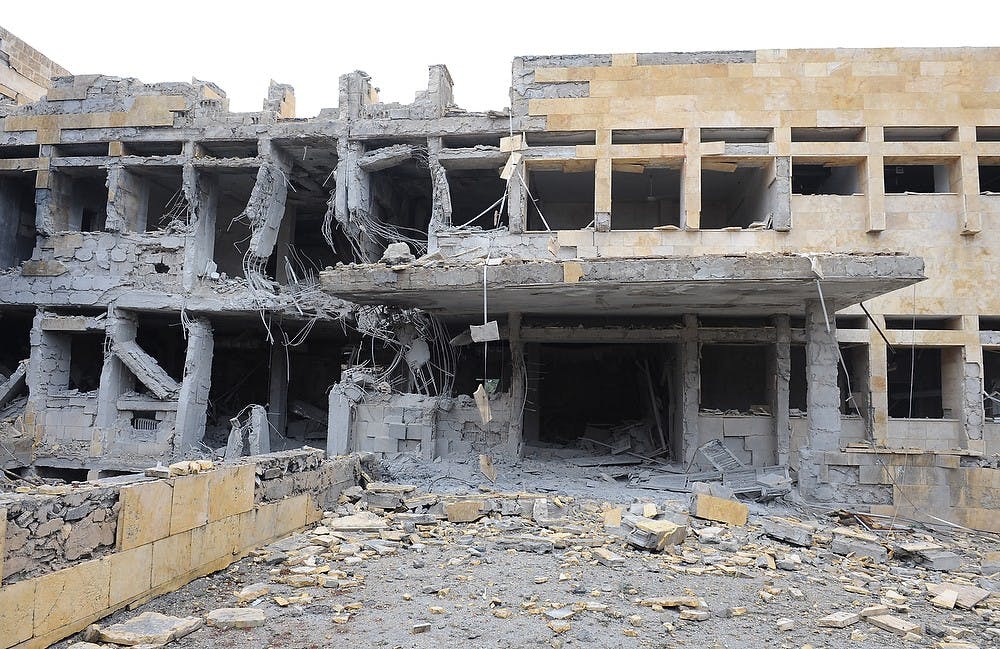In between hashing out last-minute spring break details, take a look at a few key news events happening in the world around East Lansing.
1. Looming sequester

The Syrian army turned the national hospital in Azaz in northern Syria into a military base to attack the town last June but lost the town to rebels the following month. Rebels restored the hospital and the army then bombed it from the air in January. Andree Kaiser/MCT
In between hashing out last-minute spring break details, take a look at a few key news events happening in the world around East Lansing.
1. Looming sequester
After Congress passed legislation to avert the fiscal cliff economic crisis last month, the negotiations only held off a $85 billion in across-the-board spending cuts set to take effect March 1.
The massive automatic spending cuts, often referred to as sequester, were created to pressure Congress to reach a deal that would reduce the nation’s $16 trillion debt.
If the sequester hits, “around 2,490 fewer low-income students in Michigan would receive aid to help them finance the costs of college, and around 1,300 fewer students will get work-study jobs that help them pay for college,” according to a release from the White House.
If the sequester hits, Michigan also would lose about $1.7 million in funds for employment search help, placement and referral, causing about 54,400 fewer people to receive skills and assistance to get a job, according to the release.
The two programs expected to bear the brunt of the cuts are domestic and military programs.
For MSU, the cuts could mean decreases in research funding — a major initiative on campus, as well as MSU President Lou Anna K. Simon’s Bolder by Design project.
2. The national gun debate
Discussions about gun control have been a popular topic in the U.S. following the Connecticut shooting, and legislators are making steps toward tighter gun restrictions.
This week, Congress is expected to debate legislation requiring background checks for anyone who purchases any type of gun, according to The New York Times.
President Barack Obama issued 23 executive orders last month, which included training school officials for active shooter situations and asking the Centers for Disease Control to study gun violence prevention. While Congress begins debating gun control legislation, the National Rifle Association, or NRA, continues to push to keep guns in Americans’ homes.
“Our only means of security is the Second Amendment when the glass breaks in the middle of the night and we have the right to defend ourselves,” said NRA Vice President Wayne LaPierre during a speech in Utah on Saturday.
3. Unrest in Syria
Almost every day, the Middle Eastern country of Syria appears in U.S. headlines. Since March 2011, the country has been engaged in a civil war between the forces of President Bashar al-Assad and Syrian citizens who are fighting against his rule.
The conflict arose when the government implemented harsh restrictions on protesters who rallied for more political freedoms. According to CNN, the United Nations said the death toll has reached about 70,000 and many have fled Syrian borders to take shelter in neighboring countries.
The country’s main opposition group, the Syrian National Coalition, announced Saturday it refuses to attend the Friends of Syria conference, where dozens of countries are meeting to search for a solution to the crisis.
International relations senior Anas Attal, an international student from Syria, said the coalition refuses to participate because the conferences usually are all talk and no action.
“They meet and for hours to talk and talk — boring meetings and stuff — and they get nothing out of it,” he said. “We’re not moving forward in those conferences.”
The White House has released statements recognizing the violence in Syria, yet only has agreed to provide assistance to the groups that is non-lethal. Secretary of State John Kerry sent diplomats to Syria on Monday to convince the opposition group to attend the conference.
Staff reporter Isabella Shaya contributed to this report.
Support student media! Please consider donating to The State News and help fund the future of journalism.